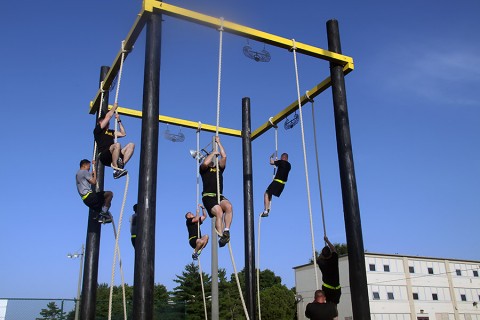Written by Staff Sgt. Sierra Fown
2nd Brigade Combat Team, 101st Airborne Division (AA) Public Affairs


Fort Campbell, KY – The 2nd Brigade Combat Team, 101st Airborne Division (Air Assault), is one of five brigades in the Army selected to participate in the performance triad pilot program, an Army-wide initiative to ensure Soldiers and their families are provided tools and information to lead a healthier lifestyle.
Started in 2013 by the U.S. Army Medical Command, the performance triad aims to optimize performance by emphasizing the importance of three components – sleep, activity and nutrition. The components of the triad have a significant impact on the readiness and resiliency of the Army’s work force.

The performance triad experts are holding training for Strike Soldiers, in their train-the-trainer course titled ”Performance Triad University.” The goal is for the P3U graduates to go back to their units and incorporate the training into their day-to-day operations.
The Strike brigade was hand-selected by Gen. Raymond T. Odierno, chief of staff of the Army, to participate in this pilot based on data generated that indicates Strike Soldiers are better fit than others within the Army’s ranks. The pilot kicked off on August 3rd here, and is slated to be ongoing within the brigade until February of next year in order to collect sufficient data.
“We know from the Army’s Global Assessment Tool survey that Strike Soldiers actually have better levels of physical activity than your average Soldier,” said Silvernail. “We’re going to bring a comprehensive suite of tools to help these Soldiers to continue to improve their physical fitness level to perform at the level they need to meet their mission.”
The triad and its resources compares the lifestyles of Soldiers to those of professional athletes. Thus implementing the “professional soldier athlete,” a term used to describe the need for the force to be able to achieve physical, emotional and cognitive prowess; optimal performance during sustained operations; the establishment of a strong and healthy social, family and spiritual support network; and maintenance of all these areas for sustained Soldier readiness and resilience.
One key component that Soldiers lack in, is the amount of sleep needed to perform optimally as a professional soldier athlete.
“All of our sleep recommendations come from national, professional organizations that have been vetted and proven in multiple scientific studies,” said Silvernail. “So in the performance triad our target goal is to get eight hours of quality sleep in a 24-hour period.”
The nutrition goals the program intends to target include refueling 30-60 minutes following strenuous exercise and to eat at least eight servings of fruits and vegetables per day.
According to Maj. Bethany A. Belanger, nutrition lead for the program, Soldiers gravely fail to meet that target. She hopes with the spread of information and resources the triad makes available will help change that statistic.
“I see a lot of Soldiers using quick fixes just to get through the day,” said Belanger. “It mostly comes in the forms of energy drinks. I hear a lot about Soldiers skipping meals because they just don’t realize how simple using real food is – fruits and vegetables to truly optimize their performance. I think starting with small changes will really help our Soldiers not only have a better nutrition outcome, but to feel better and perform better.”
The recommended level of activity, according to the performance triad, is to include two or more days of resistance training, one day of agility training, at least 150 minutes per week of moderate aerobic exercise, and 75 minutes per week of vigorous intensity physical training sessions. In addition, they suggest individuals aim for 15,000 steps per day.
On any given morning in Strike land, passersby are sure to find Soldiers meeting these goals. But the performance triad doesn’t stop in Strike’s formations. It extends to the family members that some view to be the backbone in the force.
“We realized we can teach the Soldiers all day long about how to optimize their sleep, activity and nutrition, but then when they went home their families didn’t have the same understanding of those concepts,” said Kathleen M. Whittle, performance triad team lead, Falls Church, Virginia. “We now aim to teach the family members as well so they can support the Soldier and turn it into a habit-changing lifestyle for all involved. Because when you work together as a team, it brings the family closer and increases resiliency for everyone in that household.”
“It’s an eye-opener,” said Belanger. “A lot of people know they have to sleep, they know they have to eat right, and they know they have to have activity. The problem is, a lot of them think it’s not achievable. What this program really does is simplifies it and breaks it down. It gives them the nuts and bolts that they need to actually start making better choices and most importantly changing their behaviors.”
For more information on the performance triad, visit: www.armymedicine.mil/pages/performance-triad.aspx


